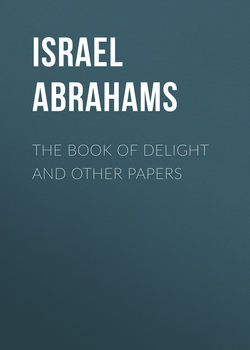The Book of Delight and Other Papers

Реклама. ООО «ЛитРес», ИНН: 7719571260.
Оглавление
Israel Abrahams. The Book of Delight and Other Papers
PREFACE
"THE BOOK OF DELIGHT"
THE GIANT GUEST
THE FOX AND THE LEOPARD
THE FOX AND THE LION
THE SILVERSMITH WHO FOLLOWED HIS WIFE'S COUNSEL
THE WOODCUTTER AND THE WOMAN
MAN'S LOVE AND WOMAN'S
IN DISPRAISE OF WOMAN
THE WIDOW AND HER HUSBAND'S CORPSE
THE LEOPARD'S FATE
THE JOURNEY BEGUN BY JOSEPH AND ENAN
THE CLEVER GIRL AND THE KING'S DREAM
THE NIGHT'S REST
THE DISHONEST SINGER AND THE WEDDING ROBES
THE NOBLEMAN AND THE NECKLACE
THE STORY OF TOBIT
THE PARALYTICS TOUCHSTONE OF VIRTUE
TABLE TALK
THE CITY OF ENAN
THE PRINCESS AND THE ROSE
QUESTION AND ANSWER
ENAN REVEALS HIMSELF
ENAN'S FRIEND AND HIS DAUGHTER
THE WASHERWOMAN WHO DID THE DEVIL'S WORK
JOSEPH RETURNS HOME TO BARCELONA
A VISIT TO HEBRON
THE SOLACE OF BOOKS
MEDIEVAL WAYFARING
THE FOX'S HEART
"MARRIAGES ARE MADE IN HEAVEN"
HEBREW LOVE SONGS
MARRIAGE SONG
OPHRAH
TO OPHRAH
A HANDFUL OF CURIOSITIES
I
II
III
IV
V
VI
VII
VIII
NOTES
"THE BOOK OF DELIGHT"
A VISIT TO HEBRON
MEDIEVAL WAYFARING
"MARRIAGES ARE MADE IN HEAVEN"
HEBREW LOVE SONGS
GEORGE ELIOT AND SOLOMON MAIMON
HOW MILTON PRONOUNCED HEBREW
THE CAMBRIDGE PLATONISTS
THE ANGLO-JEWISH YIDDISH LITERARY SOCIETY
THE MYSTICS AND SAINTS OF INDIA
LOST PURIM JOYS
JEWS AND LETTERS
THE SHAPE OF MATZOTH
Отрывок из книги
Joseph Zabara has only in recent times received the consideration justly due to him. Yet his "Book of Delight," finished about the year 1200, is more than a poetical romance. It is a golden link between folk-literature and imaginative poetry. The style is original, and the framework of the story is an altogether fresh adaptation of a famous legend. The anecdotes and epigrams introduced incidentally also partake of this twofold quality. The author has made them his own, yet they are mostly adapted rather than invented. Hence, the poem is as valuable to the folklorist as to the literary critic. For, though Zabara's compilation is similar to such well-known models as the "Book of Sindbad," the Kalilah ve-Dimnah, and others of the same class, yet its appearance in Europe is half a century earlier than the translations by which these other products of the East became part of the popular literature of the Western world. At the least, then, the "Book of Delight" is an important addition to the scanty store of the folk-lore records of the early part of the thirteenth century. The folk-lore interest of the book is, indeed, greater than was known formerly, for it is now recognized as a variant of the Solomon-Marcolf legend. On this more will be said below,
As a poet and as a writer of Hebrew, Joseph Zabara's place is equally significant. He was one of the first to write extended narratives in Hebrew rhymed prose with interspersed snatches of verse, the form invented by Arabian poets, and much esteemed as the medium for story-telling and for writing social satire. The best and best-known specimens of this form of poetry in Hebrew are Charizi's Tachkemoni, and his translation of Hariri. Zabara has less art than Charizi, and far less technical skill, yet in him all the qualities are in the bud that Charizi's poems present in the fullblown flower. The reader of Zabara feels that other poets will develop his style and surpass him; the reader of Charizi knows of a surety that in him the style has reached its climax.
.....
In the morning, the girl asked her father to give the officer the food she would prepare. She gave him thirty eggs, a dish full of milk, and a whole loaf. "Tell me," said she, "how many days old the month is; is the moon new, and the sun at its zenith?" Her father ate two eggs, a little of the loaf, and sipped some of the milk, and gave the rest to the officer. "Tell thy daughter," he said, "the sun is not full, neither is the moon, for the month is two days old." "Ah," laughed the peasant, as he told his daughter the answers of the officer, "ah, my girl, I told you he was a fool, for we are now in the middle of the month." "Did you eat anything of what I gave you?" asked the girl of her father. And he told her of the two eggs, the morsel of bread, and the sip of milk that he had taken. "Now I know," said the girl, "of a surety that the man is very wise." And the officer, too, felt that she was wise, and so he told her the king's dream. She went back with him to the king, for she told the officer that she could interpret the vision, but would do so only to the king in person, not through a deputy. "Search thy harem," said the girl, "and thou wilt find among thy women a man disguised in female garb." He searched, and found that her words were true. The man was slain, and the women, too, and the peasant's daughter became the king's sole queen, for he never took another wife besides her.
They proceed, and the asses nod and bow as though they knew how to pray. Enan weeps as they near a town. "Here," says he, "my dear friend died, a man of wisdom and judgment. I will tell thee a little of his cleverness."
.....